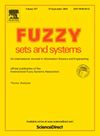Since its launching in 1978, the journal Fuzzy Sets and Systems has been devoted to the international advancement of the theory and application of fuzzy sets and systems. The theory of fuzzy sets now encompasses a well organized corpus of basic notions including (and not restricted to) aggregation operations, a generalized theory of relations, specific measures of information content, a calculus of fuzzy numbers. Fuzzy sets are also the cornerstone of a non-additive uncertainty theory, namely possibility theory, and of a versatile tool for both linguistic and numerical modeling: fuzzy rule-based systems. Numerous works now combine fuzzy concepts with other scientific disciplines as well as modern technologies. In mathematics fuzzy sets have triggered new research topics in connection with category theory, topology, algebra, analysis. Fuzzy sets are also part of a recent trend in the study of generalized measures and integrals, and are combined with statistical methods. Furthermore, fuzzy sets have strong logical underpinnings in the tradition of many-valued logics. Fuzzy set-based techniques are also an important ingredient in the development of information technologies. In the field of information processing fuzzy sets are important in clustering, data analysis and data fusion, pattern recognition and computer vision. Fuzzy rule-based modeling has been combined with other techniques such as neural nets and evolutionary computing and applied to systems and control engineering, with applications to robotics, complex process control and supervision. In the field of information systems, fuzzy sets play a role in the development of intelligent and flexible manBmachine interfaces and the storage of imprecise linguistic information. In Artificial Intelligence various forms of knowledge representation and automated reasoning frameworks benefit from fuzzy set-based techniques, for instance in interpolative reasoning, non-monotonic reasoning, diagnosis, logic programming, constraint-directed reasoning, etc. Fuzzy expert systems have been devised for fault diagnosis, and also in medical science. In decision and organization sciences, fuzzy sets has had a great impact in preference modeling and multicriteria evaluation, and has helped bringing optimization techniques closer to the users needs. Applications can be found in many areas such as management, production research, and finance. Moreover concepts and methods of fuzzy set theory have attracted scientists in many other disciplines pertaining to human-oriented studies such as cognitive psychology and some aspects of social sciences. The scope of the journal Fuzzy Sets and Systems has expanded so as to account for all facets of the field while emphasizing its specificity as bridging the gap between the flexibility of human representations and the precision and clarity of mathematical or computer
